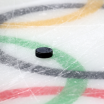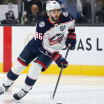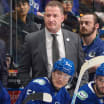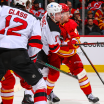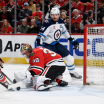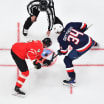Mailbag: Sabres improvement; Kane's fit with Rangers
NHL.com's Dan Rosen answers weekly questions
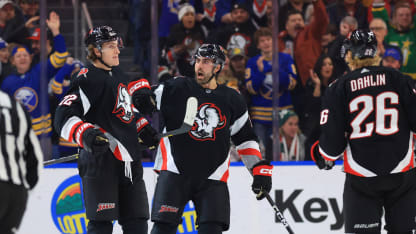
© Bill Wippert/Getty Images
Are Don Granato and Kevyn Adams slept on guys for their respective roles? Should either or both deserve some chatter for end of year awards? -- @mikeybox
I don't think they're slept on. I think they receive a lot of credit for what they've done together with the Buffalo Sabres. We're doing our Trophy Tracker series this week for the three-quarter pole of the season and Granato, Buffalo's coach, was fifth in the voting for the Jack Adams Award behind Jim Montgomery (Boston Bruins), Lindy Ruff (New Jersey Devils), Rod Brind'Amour (Carolina Hurricanes) and Dave Hakstol (Seattle Kraken). I didn't actually have him in my top five, but I can't argue with him being fifth in the voting. He's done an excellent job with a young team that is building into a serious Stanley Cup contender. I would imagine he'll get votes for the Jack Adams Award at the end of the season. It is voted on by the NHL Broadcasters' Association.
Adams, in his third season as Buffalo's GM, has been steadfast in how he's built the Sabres. His refusal to sacrifice the future for the present is admirable and correct. He wants to acquire players who fit the Sabres' age group, as he did with 26-year-old forward Jordan Greenway in a trade with the Minnesota Wild on Friday. The Sabres are not quite there yet and Adams is smart not to push the limits, but for the first time in a long time, they have a core group of players to trust and build around. If the Sabres get in the playoffs and do some damage, Adams will be a leading candidate for the General Manager of the Year Award. He is the GM responsible for the Sabres acquiring forwards Alex Tuch, Peyton Krebs, Jack Quinn, JJ Peterka and Tyson Jost, and defenseman Owen Power. Forward Tage Thompson and defenseman Rasmus Dahlin have flourished under Granato and Adams, becoming bonafide NHL stars. The Sabres have draft capital because they have not traded a first-round pick. They have two second-round picks in the 2023 NHL Draft. They have eight picks in the draft. That's solid work.
How long is Jon Cooper's leash? -- @snowj66
Imagine your dog is walking ahead of you but he's way up the road, maybe even in the next town or even state. You're still holding the leash and it's still attached to the pup, but you do not have to even worry about giving him a tug to bring him back. Heck, you don't even need to hold the leash to feel confident that he's not going to run away. That's Jon Cooper with the Tampa Bay Lightning. He has miles of leash and nobody needs to be tugging on it because it's quite obvious where he's trying to go and you trust he knows how to get there. That's what going to the Stanley Cup Final three straight years buys you, what winning the Stanley Cup back-to-back years (2020 and 2021) earns you.
I find it a little funny that this question comes to me at the time the Lightning are struggling, losers of five in a row (0-4-1) and eight of 10 (2-5-3) before a 5-2 win against the Philadelphia Flyers on Tuesday. It comes at a time when Cooper benched forwards Steven Stamkos, Brayden Point and Nikita Kucherov, Tampa Bay's three star forwards, for the third period in a 5-3 loss at the Sabres on Saturday. However, it did not come at any point in a three-month stretch from Nov. 13-Feb. 14, a time when Tampa Bay was 28-10-1, its 57 points and .731 points percentage both third in the NHL and its 3.74 goals per game tied for first in that span.
Cooper has been the Lightning's coach since March 25, 2013. He is the longest-tenured coached with his team in the NHL and he has the best winning percentage (.605) among the 100 coaches in NHL history who have coached at least 400 regular season games. There will be a time when Tampa Bay and Cooper have to part ways. Not now. Three straight trips to the Cup Final buys you the leash Cooper has now. Better yet, earns you the leash he has now. It earns you the right as a coach to bench your star players for a period. He's confident enough in himself, where he stands within the organization and with the players in the dressing room to do that knowing he won't lose anybody.
Do you believe the New Jersey Devils made a mistake by trading away Pavel Zacha to the Bruins? He's having the best statistical year of his career. -- @rudshar98
If the Devils never traded Zacha, would they have Timo Meier right now? I don't know the answer. But that's a big reason why I won't categorize it as a mistake to trade him even though statistically the trade, Zacha for forward Erik Haula, looks like a win for the Bruins. They both played in 62 games entering Tuesday, though Zacha has 43 points (16 goals, 27 assists) and Haula had 29 points (five goals, 24 assists). Zacha has found a home playing regularly in the Bruins' top-six forward group on a line with David Krejci and David Pastrnak. He's a solid, productive, versatile player who should regularly be a 20-goal scorer. The Bruins locked him up on a four-year contract starting next season that carries a $4.75 million salary cap charge on Jan. 14. It was a smart move. Zacha could be a full-time center for the Bruins as soon as next season. He's a good fit in Boston.
But the Devils traded Zacha because at the time, he looked like an underperforming player (never more than 36 points in a season) who didn't play a hard enough game or drive enough offense for them. They were making room for forward Ondrej Palat, who they signed to a five-year, $30 million contract to play that exact game. And they were giving Dawson Mercer more of an opportunity to be a top-six regular. They also knew Haula was signed for just this season before he could be a UFA, so they could benefit from him in the short term, particularly with his versatility and ability to win face-offs, without marrying themselves to another long-term contract. If Zacha were in New Jersey and having the season he is having for Boston, my guess is the Devils may have already re-signed him. That might have taken them out of the running for Meier, maybe with the Devils figuring they had the size and depth they needed and they didn't have to give up picks or top prospects to acquire it. As it is, Haula is now New Jersey's third line center with Palat on his left wing, Mercer has 21 goals, five more than Zacha, and Meier is in New Jersey, potentially for eight more years if they can get a contract extension done. There's no mistaking that.
Can you see Gerard Gallant experimenting with flipping Patrick Kane and Vladimir Tarasenko to spread out the playmakers and finishers, and bring more size to the second line? -- @92In82
If the Rangers don't start clicking with their current forward lines -- Tarasenko with Mika Zibanejad and Chris Kreider, and Kane with Vincent Trocheck and Artemi Panarin -- it's possible. But for the time being, those lines are staying together with Gallant, the Rangers coach, saying he likes how they look and wants to give them time. He's particularly going to give Kane and Panarin time to recreate the chemistry they had with the Chicago Blackhawks from 2015-17. In 2015-16, Kane won the Hart Trophy as the NHL's most valuable player and the Art Ross Trophy as the League's leading scorer, and Panarin won the Calder Trophy as the rookie of the year.
However, as I said on the "NHL @TheRink" podcast last week, I think it could also work if they switch Kane and Tarasenko. By doing that, the Rangers would have two distinct lines with each featuring a distributor (Kane, Panarin), a net-driving forward (Kreider, Trocheck) and a shooter (Zibanejad, Tarasenko). We'll see if that change eventually happens. Essentially, Kane and Panarin will dictate it. But it should be noted that Tarasenko has five points (two goals, three assists) in the past three games playing with Zibanejad and Kreider, so clearly he's found a comfort zone on that line and that should not be taken lightly.
Rupp on testing out Kane in the most talented spot
Last week you wrote about the most improved team this year (New Jersey). What about previously good teams? Which team (or teams) have fallen off the cliff this year? Those that you expected to be good (or better than their previous season). (I'm thinking Calgary.) -- @TrishTheMiddle
We're thinking alike. I have to add the Florida Panthers to the list. Isn't it ironic that those are the two that made the biggest trade of the offseason (forward Matthew Tkachuk to Florida from Calgary; forward Jonathan Huberdeau and defenseman MacKenzie Weegar to Calgary from Florida)? But this isn't on Tkachuk, who has been as good for the Panthers as he was for the Flames, or Huberdeau and Weegar, who have not had the same seamless transition in Calgary. This is about goaltending. Calgary's tandem of Jacob Markstrom and Dan Vladar have combined for a .887 save percentage. Markstrom is 17-17-8 with a 2.89 goals-against average, .894 save percentage and one shutout in 44 games. It's a far cry from last season, when he was a finalist for the Vezina Trophy, which goes to the NHL's best goalie, going 37-15-9 with a 2.22 GAA, .922 save percentage and nine shutouts. When your No. 1 goaltender falls off that far, it's impossible to be a consistent team. Sergei Bobrovsky, Spencer Knight and Alex Lyon have combined for a .904 save percentage for the Panthers, with Bobrovsky at .907 in 42 games and Knight .901 in 21 games. Sometimes the math in the NHL can be simple, and if your goalie is playing to a sub-.900 save percentage your odds of being a consistent team are slim.


